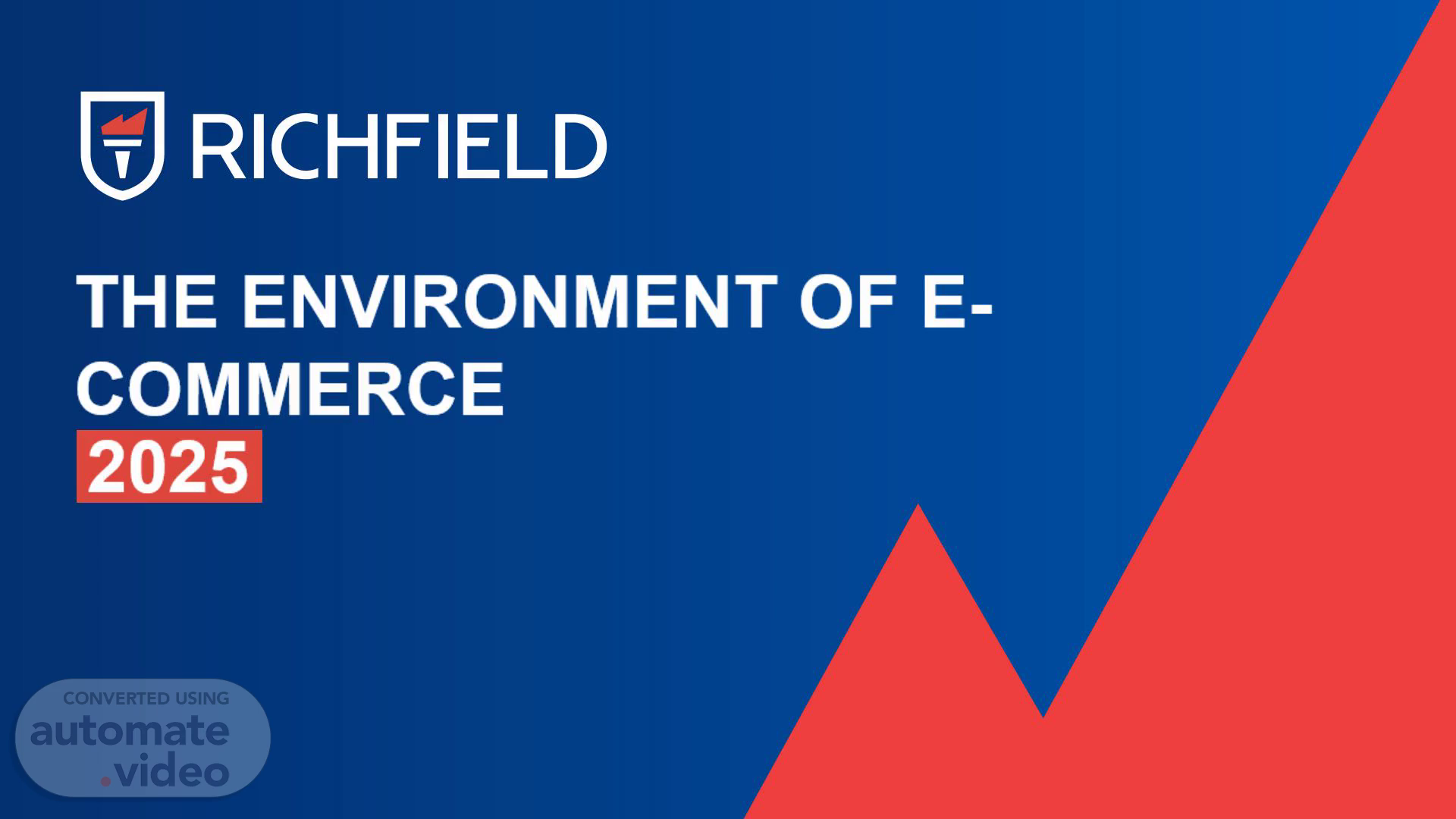Scene 1 (0s)
[Audio] Good day, today we will be going through your first chapter of electronic commerce 512. We'll look at how legal, ethical, and technological factors shape the way businesses operate online and how these elements affect us as consumers and professionals..
Scene 2 (18s)
[Audio] By the end of this session, you should be able to understand how the legal environment impacts e-commerce, identify elements of online contracts, define intellectual property laws, recognize online crime threats, understand key ethical issues, and explore how privacy and data use are managed..
Scene 3 (42s)
[Audio] Online businesses must follow the same laws as offline businesses. If they break the law—whether through fraud, negligence, or non-compliance—they can face serious consequences like fines, lawsuits, or even jail time for company leaders..
Scene 4 (1m 0s)
[Audio] E-commerce is global, but laws are local. This creates challenges. For example, a website in one country may be breaking the laws of another without realizing it. There's a need to resolve these conflicts, especially when protecting consumers and businesses across borders..
Scene 5 (1m 19s)
[Audio] Here we see how culture shapes ethics, which then influence laws. Understanding cultural values is key to building legal and ethical e-commerce strategies that are accepted worldwide..
Scene 6 (1m 34s)
[Audio] Jurisdiction is about which court has the power to rule on a case. It depends on factors like where the company operates, where the customer is, and how strong the connection is to a location. Notice and legitimacy also play key roles in establishing authority..
Scene 7 (2m 5s)
[Audio] This figure shows how physical borders influence legal ones. Even though the Internet is borderless, laws are still enforced based on geography, which complicates international online business..
Scene 8 (2m 17s)
[Audio] Like paper contracts, digital contracts require an offer, acceptance, and consideration—something of value. If one party doesn't deliver, it's called a breach of contract and can be taken to court..
Scene 9 (2m 37s)
[Audio] Online contracts usually begin with an offer, like a price on a website. When a buyer clicks "Buy Now," that's acceptance. The payment exchanged is the consideration—this completes the contract..
Scene 10 (3m 8s)
[Audio] Common types include Clickwrap, where you click "I agree," and Terms of Service, which set the rules. Web-wrap contracts are like reading the terms while browsing, and agreeing by continuing to use the site..
Scene 11 (3m 37s)
[Audio] Subject-matter jurisdiction is about the type of law involved—like copyright or taxes. Personal jurisdiction depends on where people live or where business takes place. Some companies also agree in writing to be governed by certain courts.
Scene 12 (4m 12s)
[Audio] Intellectual property includes copyrights, patents, and trademarks. These protect creators and businesses by preventing others from stealing or copying their original work or brand..
Scene 13 (4m 28s)
[Audio] Copyrights protect creative works—like music and software. Patents protect inventions for a certain time. Both give creators exclusive rights, helping them earn money from their work..
Scene 14 (4m 54s)
[Audio] Trademarks protect logos and brand names. Domain issues like cybersquatting—buying a domain name just to sell it at a high price—and typosquatting—registering misspelled names—are major problems online..
Scene 15 (5m 17s)
[Audio] Digital watermarking can hide data in media to protect it. Defamation happens when someone spreads false info that damages a person or brand—especially dangerous when it goes viral online..
Scene 16 (5m 36s)
[Audio] Using a company's images or trademarks without permission—like editing Disney characters into your own ads—can result in lawsuits. This is especially important in advertising and content creation..
Scene 17 (5m 53s)
[Audio] Crime on the web includes theft, stalking, illegal content, and hacking. Some crimes are new—like using hijacked computers to attack others. Laws often lag behind technology, making enforcement hard..
Scene 18 (6m 17s)
[Audio] Ethics matter more than ever. A single unethical act can spread quickly online and damage a brand's reputation. Laws like the Electronic Communications Privacy Act protect user privacy, but companies must also behave responsibly, especially when children are involved..
Scene 19 (6m 51s)
[Audio] Online businesses must deal with different types of taxes. Sales tax is collected at purchase. VAT is added at each stage of production. Income tax is based on profits, and customs duties apply to international shipments..
Scene 20 (7m 15s)
[Audio] When selling goods across borders, companies face customs duties based on the origin, value, and shipping method. These affect product prices and delivery costs for customers..
Scene 21 (7m 30s)
[Audio] Now let's review what we've learned. These questions will help you reflect on real-world applications of what we've covered, like understanding jurisdiction, contract types, and the difference between tax types..
Scene 22 (7m 58s)
[Audio] Thank you for your time and have a wonderful day..
